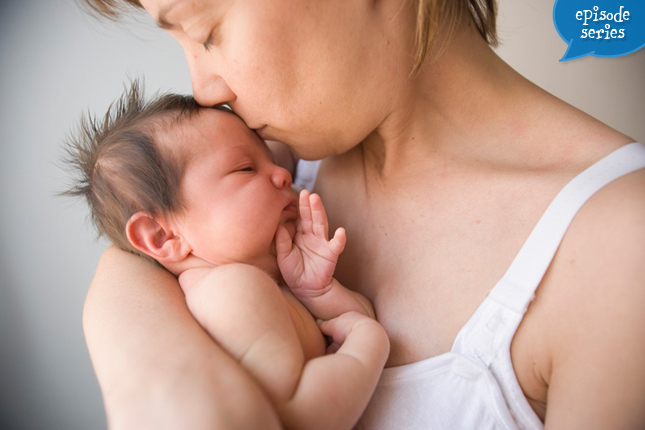Newbies
Surviving Postpartum: What’s My New Identity?
[00:00:00]
Please be advised, this transcription was performed from a company independent of New Mommy Media, LLC. As such, translation was required which may alter the accuracy of the transcription.
KRISTEN STRATTON: Women who are independent and who have found their stride in life may often struggle with the shift between caring for the baby, caring for themselves and relying on others to help support the new family. This may result in emotional and identity crisis in which women find themselves asking who I’m now that am a mother. What is my new identity?
This is Newbies.
[Theme Music]
KRISTEN STRATTON: Welcome to Newbies. Newbies is you're on online on the go support group guiding new mothers with their babies the first year. I'm your host Kristen Stratton, Certified Birth Doula, Postpartum Doula, and Owner of In Due Season Doula Services.
If you haven't already be sure to visit our website at www.newmommymedia.com and subscribe to our weekly newsletter. You can also subscribe to our show through iTunes so you automatically get new episodes when they are released.
Here is Sunny with details on how to get involved with Newbies.
SUNNY GAULT: So I would love to tell you guys about the segments that we do because it's really important we get our listeners involved. We believe this is your show, not just our show and so there are several different ways you can do that.
One of them is through our segments and the one I am going to feature today is one that I really enjoy, it is called “five-minute birth stories”. It's hard to take your birth story and condense it down to five-minutes so it is a challenge for all of our listeners out there because I’m sure there are a lot of details we want to include. We do want to Share these birth stories and it's not that they all have to be super happy with everything turned out the way we wanted it to turn out. When does that happen anyway?
If you have a story that you think is a powerful story that can help motivate moms. Maybe not everything turned out the way you wanted but you saw the light at the end of the tunnel and everything turned out okay.
I think it's important to Share this kind of stuff. There are obviously a lot of moms listening to the show and we all have different experiences and I think it’s great to hear those experiences. If you have a birth story you want to share and if you think you can narrow it down to about five minutes or less, I’m not going to time you or anything but if you think you can hit that five-minute mark, we will love to hear it.
The best way to do this is not to email, who wants to type out five minutes. It's to go to website www.newmommymedia.com and on all the pages on New Mommy Media, there is a gray little banner on the side that says send voicemail. You don't have to pick up the phone anymore, you can actually just send the voicemail straight through your computer, it will use the microphone on your computer to pick it up and you can send it straight to us and then we will take that clip and we will put it on the future episodes. So, that way everyone can hear your voice story and benefit from it and your experience as well.
KRISTEN STRATTON: All right, let us meet the mommy’s joining our conversation today. Tell us a little bit about yourself, your family and your experience with today’s topic, let us start with Graeme.
GRAEME SEABROOK: Hi guys my name is Graeme I have two children, Andrew is almost three and Lori is just five months. When I found out I was pregnant with Andrew I was also starting my own business and leaving a job to do that and I was in School. So, I have a lot of experience with today's topic, it was a huge transition for me and maybe not the best idea to all be doing that at the same time. Of course, it worked out in the end because he is three now and we haven't put him on the sidewalk yet.
KRISTEN STRATTON: That’s encouraging. All right and Gillian
JILLIAN DARLINGTON: Hi, I am Jillian Darlington, I am the C.E.O and the founder of the mom co app where moms connect. I have an eight-year-old son, I have been a single mom since he was six and I am very passionate about the motherhood lifestyle and making sure that women are connected to each other and to all the resources that they need.
KRISTEN STRATTON: All right, thanks for joining us
[Theme music]
SUNNY GAULT: Okay, let us talk about our news headline before we dive into our topic today.
Big news out of San Francisco and we talk a lot about this in newbies, the importance of being able to stay at home with your baby and have that paid family leave if it is at all possible for your family to be able to connect and bond with each other. It is so important in the beginning and so San Francisco has really stepped out. They are the first city now to require fully paid parental leave. Other companies have done this, you know, individual companies but as far as the city coming up and saying we are going to do this, San Francisco is the first city.
This was a measure and was passed unanimously amongst the city board and basically in California, we because I live in California, we have a state insurance program that pays workers 55 percent of their normal wages to take time off after birth or adoption of a child or to care for a sick family member. They kind of combine these two.
Now, this San Francisco law is going to require employers to make up the balance of the employees pay so that they earn 100 percent of their normal wages. This has not taken effect yet, it was just passed earlier I believe last week. It is going to take effect 1st January 2017 and it going to impact initially companies that have fifty or more employees. From that point, they are hoping that by the following year so 1st January 2018 that it is going to impact all employers with at least twenty workers. The employers with fewer than twenty are going to be exempt from the law.
So, I wanted to get your take on this and see if it is something you wish would come to your city. Kristen, what do you think?
KRISTEN STRATTON: It is interesting to see that law. I can get very political on this, but I think overall paid family leave is very important. I think it is something that when you compare how America handles paid family leave to other countries it is just drastically different. I think overall if we want better mental health overall as a country, we want better productivity out of employees that we need to start with the home and so I think it is a good start.
I think it is a good example and I am sure that San Francisco is a huge city and they have a very healthy economy so that is something that they can perhaps they can be the experimental model. I am interested to see how it works, the partnership because I know that my clients who have tried to get the FMLA pay, it’s a kind of a struggle to get that so I am going to keep an open mind but I am cautious. There is a little overlap there between you know who ever is licensed and I would hate to see businesses pull out, so I am just like wait and see until I get my final opinion on it.
SUNNY GAULT: Jillian what do you think?
JILLIAN DARLINGTON: I am kind of on the same team as Kristen. Six weeks is a good start but we have got so much further to go with what needs to happen just to make the whole transition period easier. It makes it easier because Dad can also be home and the entire lifestyle and income are not put at risk. I remember back in the day, this has been around for a while but you don't see the money for a really long time. There is a lot that goes into it so I think it is a good start but we have a long way to go.
SUNNY GAULT: Okay, so Graeme
GRAEME SEABROOK: Yes, six weeks does not seem like anywhere near enough personally. The whole thing seems like their heart is in the right place and they are trying to start off well but, I don't want to get too political here either, I am just unsure as to how this would work, and how it would work long term and really if it is enough for moms and dads. I am going to leave it there. Just put it down and walk away.
SUNNY GAULT: All right Jennifer what do you think? What do you think about this?
DOCTOR JENNIFER SCHERE: Well when I first read the article and I believe the article that I read they presented that as New York, as well as San Francisco simultaneously, had come up with their own new laws regarding this, I was really excited and encouraged. I understand what everyone is saying about I don’t know how logistically it will play out, but I think it sends the most important message that we need to have that we value this time for women and families. I think it speaks to what we are going to get into in a little bit about new motherhood imposing a certain level of dependency and we need the culture, the families, the people and the jobs to be supportive and understanding that and protecting that. So, from that sense I was very excited, so we will see.
SUNNY GAULT: That is a good point and the article does continue to say that also this past week New York passed what is being hailed as the most comprehensive and generous paid family leave state law which guarantees employees up to twelve weeks off to care for a new child or seriously ill family member. But that is not going to go into effect until 2021 and it pays employees up to 67 percent of their salary.
It is a little bit different but that is gaining a lot of credit now. It is also being a step in the right direction and I alluded to this earlier but there are companies out there that you can do whatever you want to as a company, you can go above and beyond what the state mandates. So I just want to give some props out there to eBay and Spotify, they offer six months of fully paid parental leave and Netflix, believe it or not, they just announced an unlimited parental leave for the first year after the birth of a child.
So, there are individual companies that are standing up and saying we understand the laws but we want to do more for our employees, and I think when you do that, when you take care of your employees it goes such a long way. You make people want to continue working for you and it creates that positive work environment. So some props to those companies and if this is a step in the right direction then at least it is a step, baby steps we say
[Theme music]
KRISTEN STRATTON: Today on newbies we are continuing our series on surviving postpartum by discussing how we adjust to our new identity after we become mothers. Our expert is Dr. Jennifer Schere, licensed clinical psychologist. Thank you for joining us Dr. Schere, welcome to the show.
DOCTOR JENNIFER SCHERE: Thank you.
KRISTEN STRATTON: So, what are some of the critical changes to a woman's sense of self when she becomes a mother?
DOCTOR JENNIFER SCHERE: I think the most significant change is that after giving birth you are in just one abrupt moment thrown into this entirely new world and this new role and it is all encompassing so it demands your complete attention every ounce of your being and this intense focus on mothering and trying to figure it all out, it forces the other parts of your identity to at least temporarily get pretty sidelined and understandably that brings up feelings of loss and grief, very often resentment especially when this other parts of our self-have traditionally been sources of self-esteem that we rely on.
I am thinking probably a woman's professional identity or how she feels about herself in her primary relationships. Here you are as a new mom and you are completely out of your comfort zone simply because you have never been in this situation before and at the same time you are often not able to access other parts of your identity or yourself that help you feel confident and valued. So this is one huge and abrupt change.
The other big issue is as a new mom, most women tend to grapple with their own feelings about autonomy and dependency and new motherhood it forces you into a certain level of temporary dependency. It doesn’t matter how high functioning you were before having a baby. You just can't maintain that same level of functioning across all areas of your life when you are mothering an infant.
So, you are faced with accepting your own limitations and you are forced to depend on other people and other resources to support you in this new role and I think this issue of needing to depend on others can be extremely uncomfortable even daunting for women who typically are extremely self-reliant and really value their ability to do so much on their own.
KRISTEN STRATTON: How do these changes alter our understanding of who we are as a parent?
DOCTOR JENNIFER SCHERE: Well I think it is great to think about parental or maternal identity as a process, developmental just like our babies who are growing, we are growing simultaneously with them. I think what makes it so hard is that at the very moment you are faced with this overwhelming responsibility that means so much to you like protecting and nurturing new life. You are also incredibly vulnerable yourself and you are tasked with needing to acquire very often, completely different skills sets and parts of yourself than you are used to.
So emotionally you can move all over the map in just a moment. A new mom is identifying with her baby, her own feelings of dependency as a young girl and then you are certainly what she is absorbed emotionally from her own mother’s feelings about being a mom.
It is all these different parts of self at different moments in time coalesce into this intense period of new motherhood when you are just trying to sort it all out and figure out how to take care of this baby and yourself.
KRISTEN STRATTON: What are some of the ways this identity crisis can manifest itself during the postpartum time?
DOCTOR JENNIFER SCHERE: So many moms are highly cognizant that they are not as present or joyful as they would like to be during the postpartum period and can be really harsh with themselves. But is such a time of psyche reorganization for a woman and that involves a lot of emotions, a lot of processing, a lot of ups and down and there is often anxiety and depression that extends beyond the baby blues, but women are dealing with a great deal of loss internally even though there is the addition of this new person to live and care for.
A woman self-esteem about herself as a mother becomes so often as the relationship with the baby develops such an important part of her own self-esteem and how she values herself. All the other parts of identity often start getting viewed through that central piece of that maternal identity. There is so much mental work going on.
KRISTEN STRATTON: To our parents, do you remember mourning your loss of autonomy when you became a mother?
JILLIAN DARLINGTON: I will take this one, no I didn’t. I have a lot of experience with babies, my mom had my siblings when I was a teenager so I went through it. I knew what I was getting into and I just gave into it, I didn’t fight it. The first three months I had Tylor, I didn’t really try to do anything but just survive and just give in to the fact that I was exhausted and I think moms these days, and that is my issue with the whole six weeks thing, six weeks is like you are barely healed.
Six weeks is a total joke to expect women to bounce back and go back to work like it is nothing. I think women need for the first three months just to really give in to the fact that their lives are completely different. Sometimes I think the depression and isolation come from fighting that instead of just giving in to it or sink into it like a hot tub, being like okay this is how this is going to be for now let me get used to it and then you can start regaining your sense of self.
I don't think you can find yourself again until you have fully embraced all the changes that becoming a new mom brings.
GRAEME SEABROOK: I have the exact opposite. I hate asking for help and I hate needing help and I am just not good at any of that. Those are not skills that I already had. I was the youngest child of four so I didn’t have any of Jillian’s experience at all and when my son was born I could not understand why I couldn't just do all of these things. I also had an emergency C-section and a pretty traumatic birth so there was a lot for me to heal and bounce back from and I honestly did not understand why I was not fine two or three days later. I was home, the hospital has let me go and I should be fine.
Part of that was that I was not on any type of maternity leave, I had left my company while I was pregnant and was working for myself on my own and so there was no idea in my head of taking time off. I was just full steam ahead and none of that worked out. That was horrible idea, don't do that.
JILLIAN DARLINGTON: I think that goes back to my point of I think a lot of women think exactly like that, that as soon as they are out of me I am done. They don't realize that really wait, all the hard stuff is just about to begin so I feel like if we get that message out to women like this is going to be rough girls, buckle up, this is not going to be pretty for a little while, and that is okay. It is really okay to not be the same person you were. You are never going to be the same person again. Don't try to be but it doesn’t mean you are not going to be as good if not better now. I am such a better person now than I was before I had my child.
I think we need to get that message out because women are scared of well, I am not going to be as fit or beautiful, I am not going to be able to perform at work or this and that. It is just like no, you are the completely different person now, it is the metamorphosis of the caterpillar going into a butterfly, you can't go back.
GRAEME SEABROOK: At all, and that the new you doesn’t necessarily need to be able to do all of the same things the old you did in the same way or as quickly or as whatever. The new you is going to be totally different for a lot of women.
KRISTEN STRATTON: So we obviously are talking about big changes. Dr. Schere, is there any relationship between the way we approach that vulnerability and dependency of our children and understanding our own dependence?
DOCTOR JENNIFER SCHERE: Absolutely, I think the way we evaluate our own parenting is so much based on what we experienced ourselves. For example, if you felt overprotected as a kid that could cause you as a parent to move in the opposite direction and be very focused on promoting autonomy. I think you just want to be careful not to overcompensate and in that case maybe encourage premature autonomy or shame your kids for their vulnerability and dependency needs and then effort to prepare your own experience. That is one side of it,
Another example would be if you felt your caregivers weren't so available or even neglectful that can make a young child learn to rely on herself and not trust that others can help.
When you are in a situation like early motherhood that imposes upon you the need to reach out to others that can make you really feel unsafe and bring up intense anxiety and also create conflict in dealing with this in your own child. I think the real issues is to be attuned to what your child's needs are at various stages and to distinguish your own issues from what your child is really needing in the moment.
KRISTEN STRATTON: How does our brain react to the demands of motherhood and our conflicts for the need of autonomy?
DOCTOR JENNIFER SCHERE: Immediately after birth our own attachment and care giving systems are incredibly activated so we are very sensitive to separations and the need to protect and feel protected. A certain amount of separation anxiety can be a signal that attachment need is important and this can create conflicts between the need for a mom to really recharge and have some time away from her baby and be able to engage in self-care and the pull to stay very close and attentive.
KRISTEN STRATTON: To our parents, do you recall experiencing this conflict and is there a particular moment you can recall and want to Share with us?
GRAEME SEABROOK: I did not just want anybody to hold him, that wasn't me. I remember feeling every time even when it was my mom or Adam or Adam's mom, people that I trust, very close people to me and even when we were in the same room, handing my son to somebody else I don't think that there are words to explain exactly how that felt.
It felt like I was handing a literal part of me like I had cut out a part of me which I guess was true and was now handing it over to somebody else. There was no one that I trusted to hold him for the first couple of weeks. I still did it but kept all those thoughts in my head, I never said that to anybody. I should be clear right up front that I ended up suffering from postpartum depression and anxiety.
So, not all the things I was thinking or feeling were exactly the most healthy things, but yes that was when my anxiety really started spiking and when I first started noticing it was how horrible it felt to hand my baby over even to his dad who of course wanted to hold him. It was very uncomfortable.
JILLIAN DARLINGTON: This is hilarious because we are such polar opposites you guys are going to get the total two sides of the spectrum. I was totally fine, for me I lived a very lonely life growing up so when I became a mom, I think like my tribal basic instincts kicked in and I feel we as women are genetically built to raise children together as a village and for me that kicked into overdrive and that is why I was so passionate about making mom friends and building my tribe even when I was pregnant.
I knew I was going to need support and I was totally okay handing over Taylor over. I had him on me all the time so if anybody ever offered to help me, and I also never received a lot of help in my life ever so it was very important to me to be open to that. I have always wanted people to step in and help me so when people have offered to help me, and I haven't got a tone of help up until recently, but it was a great experience to be able to hand him off.
It would had to be with people I defiantly trusted and other moms. I also learned to offer to help people, I was always very helpful and offering to help other moms with their babies so that way it made it easier for me to ask for help as well.
DOCTOR JENNIFER SCHERE: I had a thought, so Jillian what is interesting is that you said you came from the experience of doing a lot of things on your own but it does sound that there were such a desire and an openness to trust other people and want to connect and receive that. So I wonder if that is what helped make that peace much more comfortable for you. And I am also wondering if you guys think that your own attachment issues came up at all in terms of that security or lack of anxiety around the proximity to your baby and all the caretaking?
GRAEME SEABROOK: Definitely, ten million percent. There is somebody who said, I can't even remember who it was, I don't know if it was a therapist or a friend who said to me that one of my most important jobs as a mom would be to try and separate how I felt as a child from how I felt about my child. That is something I learned and that I work on all the time. I think it starts right at the beginning as you said.
JILLIAN DARLINGTON: I think it is interesting too because you said you had a bunch of siblings, I didn't. I didn’t have any siblings until I was twelve. I was the only child and my mom was disengaged with me. She made it very clear that I wasn’t an accident but I was very much a mistaken sort of scenario and it is interesting because I always remained open to wanting love and wanting help. It did not shut me down and I always had a big gaping wound of like love me love me, do you love me now, do you love me now? How do you love me? It has always been at the forefront of my existence to try to earn people's love. I have always been trying to learn because I was not just automatically given it by my parents.
A lot of children are just born and their parents love them so they don't know what that is like to constantly have to try to figure out how do I make this person love me? Or how do I make this person want to have me around? That is something I have had to do my entire life.
KRISTEN STRATTON: When we come back we will continue our discussion about surviving postpartum and the conflict between autonomy and dependency. We will be right back.
[Theme Music]
KRISTEN STRATTON: Welcome back to the show, we are talking to Dr. Jenifer Schere about changes in postpartum identity. Dr. Schere can you explain the challenges mother experience when they need help but don't want to or don't know how to ask for it?
DOCTOR JENNIFER SCHERE: Sure, I think understanding what feels so painful about receiving or asking for help is really the key and it goes back to what we were just talking about. If the young child felt ashamed for needing help or really couldn’t rely on others to feel that other people understood her emotionally, get her and what she needed then she learned that depending on others can make her feel weak and diminished as opposed to that loved feeling and expansive and connections with others.
If it was unsafe to rely on others perhaps from abusive situations or neglect, then it can feel extremely traumatic and just dangerous in your bones to be in the situation that demands that you allow others to come close and help you out this way.
Again I think the goals to distinguish your own feelings around our experiences as a kid and to be present for our kids in terms of what is really going on for them.
KRISTEN STRATTON: How does asking for help affect maternal self-esteem?
DOCTOR JENNIFER SCHERE: If you think about how you learn, learning really involves learning from other people so take the example of the basic traditional way of teaching a kid how to throw a ball, you throw the ball for them and the watch, they are observing what you are doing then you are helping them maybe position their hands the right way, you might even physically assist them a few times until they get the sequence down, and then they will try it on their own. You then come back and you offer information to either correct it or try to own their efforts in a positive way. Initially, they are depending on us and that is a really good thing when people are respectful of those needs.
I wish dependency was not seen as such a bad word in our culture overall because it really can be a healthy and vital part of intimacy and connection.
KRISTEN STRATTON: To our parents, did you struggle with reaching out to others for help when you had your baby?
GRAEME SEABROOK: I just flat out didn’t do it. I just did not ask for help and in fact pushed away help that was offered which is the opposite of everything you guys should do, whoever is listening, don't do that. It does not work out well. But yes it was more than a struggle.
JILLIAN DARLINGTON: I remember sitting just wishing I had more people to ask for help because I didn’t really have anybody to ask for help and that is why I got so busy creating my tribe of mom friends because when I got divorced the only people I had to ask for help were my mom friends. I got very comfortable asking for help because I didn't have a choice and I think I was forced into it very much. I have always been very comfortable asking for assistance. It doesn’t really make sense why psychologically but I just have been.
Again I think it goes back to the fact that I am very quick to offer my own assistance and I think since I am open to offering to help people that make me more comfortable with also asking people for help. I have been a single mom for six years and I have had two companies, there is no way I would have survived without being comfortable asking for help.
KRISTEN STRATTON: My experience was really unique compared to my sibling’s experiences. I am the youngest of four just like you Graeme except I am the youngest by a lot. When I was born I was an 'oops guess what? Baby.' My mom was almost forty when she had me so my older sister was seventeen and graduating in high school the summer that I was born. You can imagine my mom going to all the graduation events with a newborn on her hips.
When I had my children my siblings had already been married and had children for sometimes and so for a lot of my desire to connect with them I was hoping like oh I am a mom now, now you guys actually want to hang with me because I am not like the bratty little sister anymore. It was a huge transition for me because up to that the reason how I got attention like Jillian was saying, I got my attention by doing well in school and by being successful in my career.
I was actually getting my master’s degree when I got pregnant with my first and I was so sick I had to actually drop out of this really competitive program and I was only one of twenty people that got accepted and I was like my parents were finally proud of me, you know I finally did something right with my life, then I got pregnant and had to drop out of school.
I really moaned not going to school, I really moaned not having the relationship with my siblings I thought I was going to have because I thought now that I am a mom they will see me as this mature grown adult and they will want to connect with me and only for me to reach out when I did and say hey I need help from you guys and to get rejected. It was not only extremely painful because I needed help, but was also extremely painful reminder that I didn't have these relationships with these people. I thought I did not have any clue who I was.
My whole life was like this is who I am going to be when I become a mom was based on pleasing everybody else but had nothing to do with my actual success about being a mom. Something I am always working on is trying to be the mom that my kids need and not be the mom that I want other people to see that I am. At the end of the day they don't really matter, it is everyone who lives in your house that matters. That is just a huge transition, not to do things for others but do them for yourself so that you benefit your kids.
DOCTOR JENNIFER SCHERE: Don’t you think that is a huge part of the maternal identity also? You shift away from who you are in all of your relationships in those roles like daughter, sibling, all of that to get to the place you are describing right now which is what really matters most in your heart is who you are in this relationship with you new family?
Not that the others don't have meaning and value, I think it all gets sorted out but there is such a shift in the emphasis of how you experience yourself.
KRISTEN STRATTON: Yes and that touches on what I was going to ask you next, how do we reconcile these conflicts between who we are and the mother we want to be?
DOCTOR JENNIFER SCHERE: I think motherhood it is enormously painful for many women because you are just going through so many changes. I think for most people changes involve newness and birth but loss. That is a whole process. I still feel in spite of that over time it is one of the most amazing windows of opportunity to confront different parts of ourselves that we want to heal and change and to expand into areas that we really didn’t know about ourselves before having kids.
I think it goes back to what we are all talking about which is the key to self-awareness and just key processing what comes up from the past or from different parts of yourself when you are in the here and now with your own kids and the more you are able to recognize the emotional time travel as it is happening, the more control you have to make choices of how you want to parent in real time with your own kids.
JILLIAN DARLINGTON: My big thing is education. I feel like when we go to birthing classes and we go to breastfeeding classes, everybody talks so much about the physical aspects of motherhood and I just don't think people talk about the psychological aspects of it and the coping mechanisms enough.
What I always tell new moms is this is going to be so hard and it is okay. It is hard for everybody and these are the things you are going to need to make it less difficult. I feel like if we start that conversation while women are still pregnant with their first ones, then it is not such a slap in the face when they are faced with this afterward.
I am so passionate about it because it is not talked about enough and I for me I remember sitting and crying because I was in so much pain I couldn't get up to make myself food yet I was starving. I didn’t have a group of girlfriends before I had my son to set up a system where people were bringing me food.
Every new mom, especially first-time moms need that system set up for them. I didn't even now people did that for people because I was twenty-five and I was the first one in my friends to have a baby. I feel like so much of that stuff is not talked about and it needs to in every single birthing class.
KRISTEN STRATTON: Wow, thank you so much Dr. Schere and our wonderful parents for joining us today in our discussion about finding our identity after baby.
For our newbie's club members, our conversation will continue after the end of the show as Dr. Schere will share some tips for choosing the right people to ask for help and maximizing the support from your social circle.
[Theme music]
SUNNY GAULT: All right, before we wrap things up we do have a “baby oops” segment for you guys. I love this segment because it makes us all feel more normal, that is what we have been talking about in today’s episode, right, that we need to be more real about what is going on in our lives. This is in the segment we say hey you know sometimes funny things happen, they might not be funny at the moment but definitely funny afterward. I think this is one of the situations.
This comes from Jayda and I love how she opens it up. She is like 'it didn’t happen to me, but my cousin when her daughter was a few weeks old she caught a cold and had a stuffy nose. My cousin kept using the nasal suction thing on her and could not figure out why it was not helping. Apparently she was putting the thing in her baby's nose and then squeezing and pulling it out as opposed to sucking it out so basically she was just packing the snot into her baby.'
Well, you know, I mean who knows what to do with those things, seriously right? Poor little kid, I am sure she learned and was able to figure it out and it all ended well. Great story Jayda, thanks so much for sending it, we all feel for the baby and the mommy too.
If you guys have a funny “baby oops” story you want to send to us please do so. You can send it through the website at www.newmommymedia.com, just click on the contact link. You can also post it to our Facebook page, or a voice mail, however, you want to do it and we will post it on a future episode.
KRISTEN STRATTON: That wraps our show for today. We appreciate you listening to Newbies.
Don’t forget to check out our sister show:
• Preggie Pals for expecting parents
• The Boob Group for Moms who give milk to their babies
• Parent Savers for moms and dads with infants and toddlers and
• Twin Talks for parents with multiples.
Thanks for listening to Newbies, your go-to source for new moms and new babies.
[Disclaimer]
This has been a New Mommy Media production. The information and material contained in this episode are presented for educational purposes only. Statements and opinions expressed in this episode are not necessarily those of New Mommy Media and should not be considered facts. While such information and materials are believed to be accurate, it is not intended to replace or substitute for professional, medical advice or care and should not be used for diagnosing or treating health care problem or disease or prescribing any medications. If you have questions or concerns regarding your physical or mental health or the health of your baby, please seek assistance from a qualified health care provider.
SUNNY GAULT: How would you like to have your own show on the New Mommy Media Network? We are expanding our line-up and looking for great content. If you are a business, or organization interested in learning more about our co-branded podcast, visit our website at www.NewMommyMedia.com.
[00:38:21]
[End of Audio]












